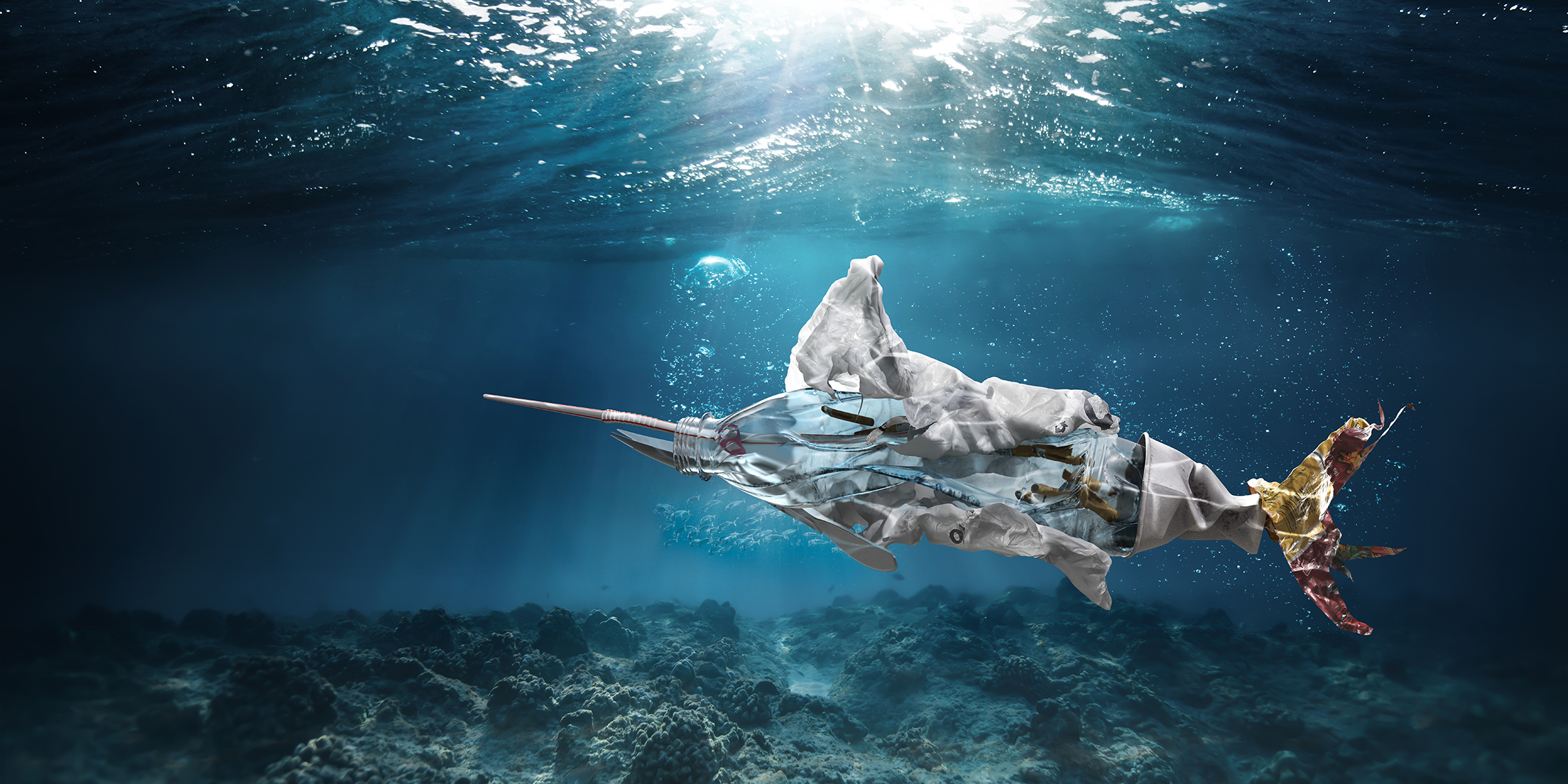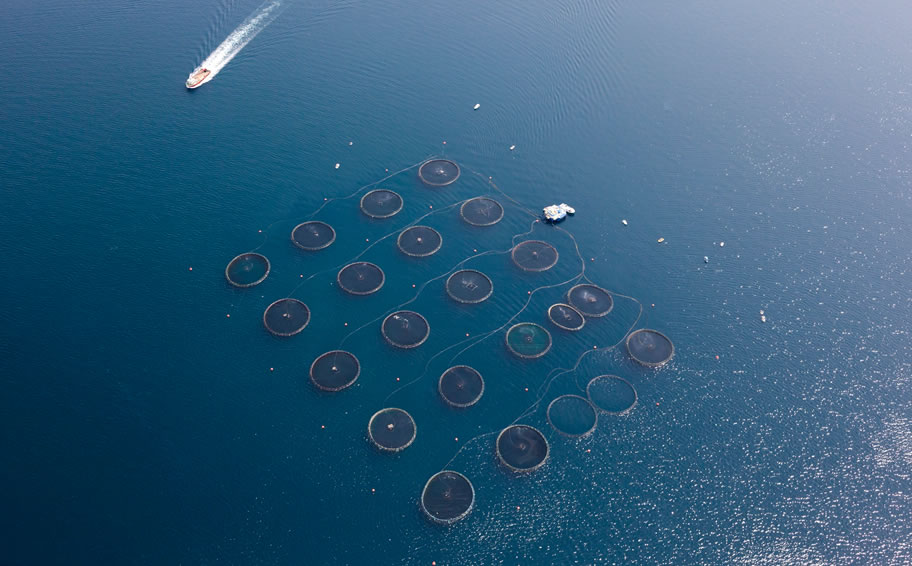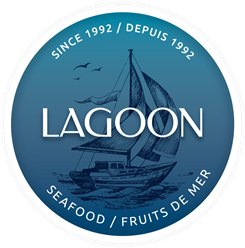
Fisheries
The world’s fishing fleet is so large that it can be seen from space. And this is what researchers at the University of California in Santa Barbara decided to exploit to assess the environmental impact of fisheries. (Source: Québec Science magazine)
According to their findings published in the Revue Science, fisheries now cover 55% of the world’s ocean surface, four times the area covered by agriculture. In 2016 alone, 70,000 commercial fishing vessels travelled 460 million kilometers, the equivalent of 600 return trips to the Moon. (Source: Québec Science magazine)
However, it was clear to researchers that commercial fishing efforts are greatly influenced by political and cultural realities, such as seasonal bans and festivities by different peoples. (Source: Québec Science magazine)
Active measures to ensure sustainable use of ocean resources are being put in place as global demand for seafood is increasing and fish stocks are falling. For example, the mesh size of the nets must not be too small so that the youngest fish are not caught and thus allow the species to renew; some nets are equipped with devices that allow turtles to escape from them (TED device); the fishing of many species is subject to strict quotas decided by government bodies based on the recommendations of observers, scientists, and economists.
Based on information on marine ecosystem dynamics, more and more countries and regional fisheries management organizations (RFMOs) adopt an ecosystem approach to fish stock management to avoid overfishing and allow for the recovery of natural resources.

Aquaculture
Aquaculture is the world’s fastest growing food production industry. (Source: WWF)
Demand for fish continues to rise, even as wild catches stagnate (95 million tonnes per year). Aquaculture, which already supplies nearly 50% of the fish consumed (50 million tonnes) is therefore a solution to avoid the depletion of marine stocks.
Aquaculture involves many types of seafood, fish, shellfish, crustaceans and seaweed. Aquaculture sites can be found in marine or inland waters.
Aquaculture, of course, in order not to harm the environment, must be carried out in ways that limit its impact on nature and wild stocks.
Many organizations help governments and industries regulate aquaculture activities to produce fish and seafood from sustainable, healthy aquaculture for consumers, with reduced use of antibiotics and pesticides, and environmentally friendly by reducing production waste and limiting the number of fish escaping from farms.
The Regulatory Bodies

The regulatory bodies
The Marine Stewardship Council (MSC) is an independent, non-profit organization that works to counter overfishing. The MSC has developed a series of sustainable and responsible fisheries environmental standards, and accredited seafood products are labelled with the MSC Blue Eco-label. This eco-label identifies wild caught seafood products from sustainable sources. More information is available on
MSC website,
www.msc.org

What is ASC?
The Aquaculture Stewardship Council (ASC) is also an independent, non-profit organization that manages a set of standards governing responsible aquaculture. Products from accredited livestock farms are labeled ASC. This eco-label identifies sustainable seafood products from fish or seafood farms that meet established standards. More information is available on the ASC website, www.asc-aqua.org.

What is Ocean Wise?
Ocean Wise is an oceans protection program created to inform consumers and businesses about fisheries and aquaculture issues to help them make environmentally responsible fish choices, and of seafood. Ocean Wise works directly with its partners to ensure they have the latest scientific information on their seafood products, so that we can make decisions that respect the health of the oceans.
The presence of the Ocean Wise logo on a menu or package allows consumers to easily identify environmentally responsible choices that preserve the health of our oceans for future generations.
Other associations include (Friend of the sea and Naturland International…)
The commitment of Lagoon Seafood
A team dedicated to quality
Lagoon Seafood has implemented, with the approval of the Canadian Food Inspection Agency (CFIA), a Quality Management Program (QMP) for its plants in Lachine and Granby, Quebec, Canada.
These programs are voluntary and allow us to monitor the quality of all our products distributed by Lagoon Seafood.
Lagoon Seafood is one of the few companies in Canada that has integrated fresh seafood imports into its QMP program.
Our Quality Management Department, composed of a Quality Assurance Director and two Quality Controllers, ensures continuous control of incoming and outgoing products into our warehouses and production in our plants.
Lagoon Seafood products and processes are also subject to external audits by independent bodies. Lagoon Seafood is approved by internationally recognized certification bodies including MSC, BRC, Ocean Wise, and ASC.
Towards a green company
Lagoon Seafood has initiated an internal program to make its plants and offices more environmentally friendly.
Lagoon Seafood adheres to the Quebec program ’Ici on recycle’ reducing waste production and implementing waste recycle programs as much as possible.
Lagoon Seafood trains all its employees to better understand nature protection issues, particularly in the workplace.
Controlled procurement
Lagoon Seafood’s buying team specializes in sourcing a wide range of exotic products from around the world, from South America to Europe, Asia, West Africa, and the Mediterranean Sea. Purchases are made directly with fishing and aquaculture companies, without intermediaries, allowing Lagoon Seafood better control of the origin and quality of the products sourced.
An ecological and eco-responsible transition
Lagoon Seafood is committed to reducing its environmental footprint. Products will be offered in recyclable number 2 external plastic packaging and no longer in non-recyclable number 7 plastic films.
Lagoon Seafood’s goal is to transition to environmentally friendly recyclable packaging that consumers can recycle wherever possible.
Ethics and food safety
Lagoon Seafood recently made a commitment to Vigilance OGM, a non-profit organization that fights against the production of genetically modified organisms, including the production of GMO salmon.
Lagoon Seafood recognizes the production of GMO salmon recently authorized by the Canadian government but has adopted the precautionary principle and chosen not to market this product.

